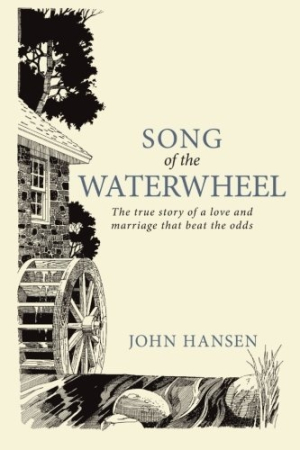Song of the Waterwheel
The True Story of a Love and Marriage That Beat the Odds
John Hansen’s Song of the Waterwheel is a love letter to his late wife, a woman whose stunning beauty struck him like lightning and whose even more endearing soul kept him enthralled for twenty-eight years. This loving yet honest memoir is a moving remembrance of their life together, one tragically cut short by the cancer that destroyed her from within.
For many who have suffered through or are facing a similar loss, this will be a difficult read; for others it will be a hard book to put down. The memoir is Hansen’s way of dealing with his broken heart, one that is healing slowly thanks to the support of his friends, family, and faith. Some may scoff or groan over the parts of the text where Hansen gushes on about how much of what was good in his life he credits to God, his church, his pastor, and prayer, but it is obvious that he believes this to be true.
Hansen is not a saint. He admits to having lived a “two-fisted lifestyle” in which “women were [his] weakness.” Twice divorced before meeting the love of his life (who sought an annulment not thirty days after the marriage and many years later insisted on a short trial separation), Hansen acknowledges that life with him was often volatile. His wife, Kristine, a former beauty queen, Playboy Club Bunny, and always very independent sort, also had “a defensive hostility streak in her.”
As Hansen candidly explains, “our marriage is best understood as the real-life adventure it really was; it wasn’t a surreal, sugar-sweet bed of roses. We were real people, fault-ridden folks who fought almost as passionately as we loved and lusted for each other.” Rarely are writers so brutally frank about their own lives; that Hansen is makes his book all the more believable and appealing.
A former police officer turned private detective and an avid horseman and outdoorsman, the author punctuates his memoir with experiences and anecdotes drawn from those careers and lifestyles. There are family tragedies in abundance, from abusive parents to suicidal siblings, yet struggling through such a “furnace of catastrophe,” as Hansen remarks, only made his marraige stronger: “Our intimacy and trust became deeper, sweeter, and satisfying beyond the power of words to describe.”
In the memoir’s final chapters, Hansen reaches down deep to pull out the words to describe that intimacy, as well as the bond he and his wife forged with their parents and children. The last fifty pages strongly convey the pain and helplessness he felt as his wife withered away. It is Hansen’s hope that sharing his own personal tragedy will “bring about the strengthening of other men who have or will go through the grief process, and face picking up the broken pieces and building a new life from the ashes of great loss.”
Reviewed by
Mark McLaughlin
Disclosure: This article is not an endorsement, but a review. The publisher of this book provided free copies of the book and paid a small fee to have their book reviewed by a professional reviewer. Foreword Reviews and Clarion Reviews make no guarantee that the publisher will receive a positive review. Foreword Magazine, Inc. is disclosing this in accordance with the Federal Trade Commission’s 16 CFR, Part 255.

